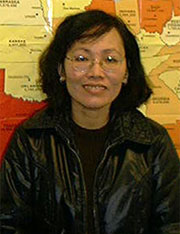Like many of the adult immigrant-learners who are part of the Learner Portraits' study, despite her lack of English when entering the country, Mai made great strides in her English language proficiency and confidence in the use of English in her first year of residency in the U.S. Mai entered ESL classes at Portland Community College (PCC) in September of 2002 without previous experience learning English in a formal setting. Five months later, in February 2003, she reported relying on help from her sister when needing to use English: "when I uh need to do (+) in the new language I talk with my sister uh help me please and she can help me (1:43)".
Thirteen months after that interview, and 18 months after starting her study of English (March, 2004), Mai expressed some confidence in being able to use English on her own:
| Mai: | (xxx) um I am studying English uh in PCC Sylvania. (2.0) Uh last year, mm I feel very difficult (+) mm cause I don't understand English. Um now I can hear a little bit and mm (+) I feel better when I go out. I (don't afraid) uh and understand (last year). | |
| Hide Conversation | ||
In an interview from early 2006, Mai was asked whether she did active work to continue to learn even though full-time work and family obligations prevented her from taking ESL classes.
| I: | Okay. Do you learn English on your own? | |
| Mai: | Yes, I do. | |
| I: | How? | |
| Mai: | Usually I watch T.V. | |
| I: | Watch T.V. | |
| Mai: | Sometimes, I repeat after each sentence they speak. I repeat it. Sometimes if there is any sentence on T.V. that I don't understand then I repeat it over and over again. I also get out a dictionary to see its meaning. | |
| I: | Besides watching T.V. Do you do anything different to learn more English? Do you learn English on your own? | |
| Mai: | I do try to speak with people in my company. Sometimes there's nothing to talk about. I would try to talk about this and that so that I can speak so that I can practice more. | |
| Hide Conversation | ||
In this same interview, Mai talked about media (television) facilitated her English language learning but, specifically, how cultural traditions in the U.S. were important for her to investigate.
| I: | Ok, you said that you've participated in American holidays. So, while you participated in these holiday events, you… | |
| Mai: | I respond to them. | |
| I: | You respond to them. But when talking about the atmosphere of learning a language, for example, you understand, for instance, Thanksgiving, you understand how Thanksgiving is. You have to discover that holiday through English or by asking other people. But in speaking about learning a language, how did you join in that tradition or that holiday? | |
| Mai: | Well, I heard about it from my family and I also watch T.V. | |
| I: | Watch T.V. to know more about that holiday. | |
| Mai: | Yes. I see that the holiday is a celebration for the North American people to give thanks for the discovery of a prosperous land and for their survival there. That is also a good thing. | |
| I: | So you do use the language to find the culture. Is that right? Right? | |
| Mai: | Yes. I see it on T.V. | |
| I: | Watch T.V. so that we can understand for instance, Thanksgiving or Christmas or Valentine's, for example. Do you use a language to ask to understand about the holiday so that you can participate in that holiday? | |
| Mai: | In general, I do try to discover them mostly through conversation I have with close people. I hear about their myths and things like that or their meanings. | |
| Hide Conversation | ||
